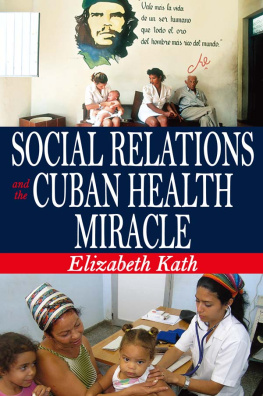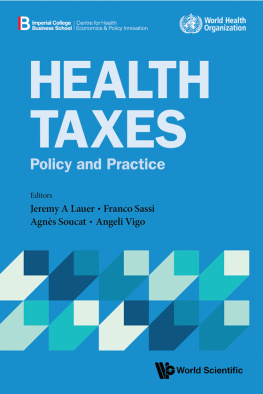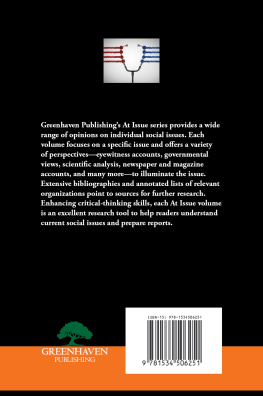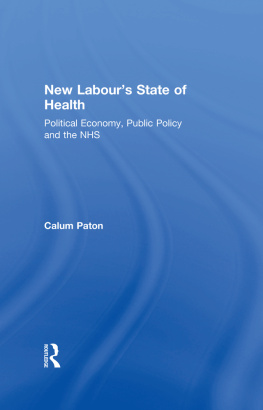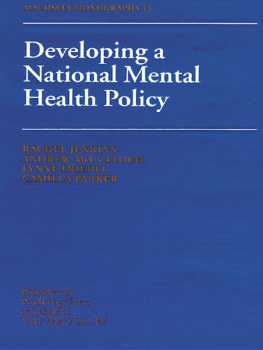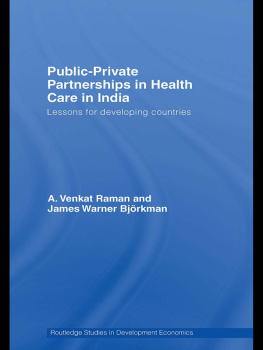SOCIAL RELATIONS and the CUBAN HEALTH MIRACLE
SOCIAL RELATIONS and the CUBAN HEALTH MIRACLE
Elizabeth Kath
First published 2010 by Transaction Publishers
Published 2017 by Routledge
2 Park Square, Milton Park, Abingdon, Oxon OX14 4RN
711 Third Avenue, New York, NY 10017, USA
Routledge is an imprint of the Taylor & Francis Group, an informa business
Copyright 2010 by Taylor & Francis.
All rights reserved. No part of this book may be reprinted or reproduced or utilised in any form or by any electronic, mechanical, or other means, now known or hereafter invented, including photocopying and recording, or in any information storage or retrieval system, without permission in writing from the publishers.
Notice:
Product or corporate names may be trademarks or registered trademarks, and are used only for identification and explanation without intent to infringe.
Library of Congress Catalog Number: 2010002367
Library of Congress Cataloging-in-Publication Data
Kath, Elizabeth.
Social relations and the Cuban health miracle / Elizabeth Kath.
p. cm.
Includes bibliographical references and index.
ISBN 978-1-4128-1417-1 (alk. paper)
1. Social medicine--Cuba. 2. Medical care--Cuba. 3. Public health--Cuba. I. Title.
RA418.3.C9 K38 2010
362.1097291--dc22
2010002367
ISBN 13: 978-1-4128-1417-1 (hbk)
Contents
In completing this book, I owe most to Geoff Dow for his inspiring intellectual contributions, his unceasing generosity in dedicating time to read and comment on my drafts, and his support, good humor and encouragement throughout the entire research and writing process. I gratefully acknowledge the academic communities at the School of Political Science and International Studies at the University of Queensland, and the Global Cities Institute at RMIT University, who provided a supportive and accommodating environment in which to work.
Un milln de gracias a todos mis amigos y contactos en Cuba y a los cubanos que conoc fuera de la isla; agradezco no solo a quienes me brindaron su tiempo en entrevistas pero tambin a todos los que conversaron conmigo durante el proceso de investigacin y escritura de este libro. Sin su contribucin no me hubiese sido possible llegar a conocer y entender un poco de la realidad Cubana, ni mucho menos a realizar este trabajo.
I would also like to thank: Rachel Parker for her timely and valuable input; Andy Hindmoor to whom I am immeasurably grateful for his support, feedback and encouragement; Bronwyn Wex, David Hundt, and Jennifer Laakso for being terrific colleagues throughout the research process and for patiently listening to my ideas on many occasions; Tim Anderson, for generously devoting time in Cuba to discussions about my research; Katherine Hirschfeld, for whom I not only have great respect as a scholar, but to whom I am deeply grateful for the warmth and enthusiasm with which she has encouraged me to publish this research, shared her knowledge and experiences, and recommended my work to other scholars; Paul James for making the time to discuss my work on numerous occasions over the years, and especially for his mentoring, encouragement and pearls of wisdom over the past year; the staff at Transaction Publishersparticularly Irving Louis Horowitz, Mary E. Curtis, Jennifer Nippins, and Angel L. Sotofor their interest in this work and the time and effort they devoted to guiding the book through the editorial process; Tania Florez and Heike Kath, for general supportiveness, but more specifically, for providing helpful contributions of medical perspectives on various ideas and clarification of medical terminology; Jake Najman and Leonie Callaway for the advice they provided on maternal mortality causes; Johan Sb for the openness and collegiality with which he shared his knowledge and experiences relating to his research in Cuba; and to all those who took the interest and time to read and comment on the manuscript in the lead up to its completion.
Thank you to my family, especially Mum, Father, Arthur, Henry, Sebastian and my fantastic cousins for their support and for enduring my periods of absence while writing this work. For their time and support, which I will never forget, I also wish to acknowledge: Barbara Sullivan, Daniel Syvertsen, Brett Thompson, Bill Ransome, Ben Gilna, Sally Queitzsch, Natalie Grzic, and the many others who helped in innumerable ways throughout the research and writing process. While I owe an enormous gratitude to all mentioned here, the responsibility for any error, omission or misinterpretation in this work is of course entirely my own.
Finally, but importantly, I am grateful to the other scholars whose previous work, acknowledged throughout, helped to inform and inspire this research.
NB. Although all but two of the respondents gave their formal consent to be identified by name, title and institution, as a precautionary measure all names have been coded to protect respondents identities. Wherever possible, non-specific descriptions of job titles have been provided. Names of specific hospitals and clinics have also been omitted. This list is nevertheless intended to give some idea of the types of respondents who were involved.
Interview 1Dr. Jos Rivera. Gynecologist/Obstetrician and Teacher. Interviewed 14 July 2004.
Interview 2Dr. Carla Lopez. University Lecturer. Interviewed 19 July 2004.
Interview 3Prof. Sandra Blanco. University Professor of Sociology (specializing in public health). Interviewed 20 July 2004.
Interview 4Sonia Fernndez. Social Worker from Havanas National Centre for Sexual Education (CENESEX). Interviewed 20 July 2004.
Interview 5Roberto Sanchez. Social Researcher. Centre for Social and Psychological Research (CIPS). Interviewed 23 July 2004.
Interview 6Dr. Rodrigo Valdes. Specialist in Internal Medicine. Interviewed 2 August 2004.
Interview 7Dr. Mario Almeida. Cardiologist (Sub-Specialty in Pregnancy). Interviewed 2 August 2004.
Interview 8 (Joint Interview)Marina Delgado and Josefina Surez. Representatives from the Federation of Cuban Women (FMC). Interviewed 10 August 2004.
Interview 9Dr. Pablo Ramirez. Representative of the Cuban Ministry of Public Health (MINSAP). Interviewed 6 September 2004.
Interview 10Dr. Enrique Ramos. Representative of the Cuban Ministry of Public Health (MINSAP). Interviewed 6 September 2004.
Interview 11Dr. Elena Castillo. Medical Specialist and Basic Work Group (GBT) Superviser at a Policlinic. Interviewed 20 September 2004.
Interview 12Susana Gonzlez. Social Worker at a Maternity Home (HogarMaterno). Interviewed 21 September 2004.
Interview 13Dr. Fernanda Medina. Paediatrician and Teacher. Interviewed 21 September 2004.
Interview 14Dr. Arturo Jimnez. Director of Neonatal Department in a Maternity Hospital. Interviewed 22 September 2004.
Interview 15Dr. Isaac Herrera. Director of Obstetrics in a Maternity Hospital. Interviewed 22 September 2004.
Interview 16Dr. Milagros Rios. Family Doctor. Interviewed 23 September 2004.
Interview 17Dr. Lola Molinero. Teacher of Medical Sciences. Interviewed 30 September 2004.
Interview 18Dr. Carlos Diaz. Former Family Doctor (still living in Cuba). Interviewed 1 October 2004.

